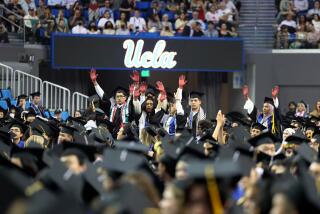Laser tag, karaoke keep finals from being a test of nerves
- Share via
It was just before midnight and hundreds of students in the Caltech cafeteria were digging into plates piled high with eggs, bacon, doughnuts, French toast and fruit. Nearby, several top administrators, including President Jean-Lou Chameau, whipped up omelets for the noisy crowd of future physicists and engineers.
The idea was to make it easier to swallow the next item on the menu for these students: final exams.
Caltech junior Jessica Davis, who was about to launch into a four-hour take-home exam in quantum mechanics, said she appreciated the social interlude and free food at the “midnight munchies” party last week. “It certainly is a way of forcing students out of their rooms and de-stressing before taking their finals,” said Davis, 21, an astrophysics major from Kansas.
Lowering student stress during end-of-term exams, scheduled for this week at many colleges, is the goal of a growing number of serious and wacky events at campuses in California and across the nation. College students have always tensed up during finals, but school officials say the bad economy and scary job market are increasing the pressure even more this year.
So, along with extended library hours, extra counseling and quiet study spaces, colleges are offering bounce houses, laser tag, pajama runs, petting zoos, oxygen bars and chicken soup deliveries. There are karaoke sing-alongs, labyrinth walks, artificial snowfalls, comedy hours and miniature golf. And, of course, hot chocolate and neck massages.
At Harvey Mudd College in Claremont this week, 10,000 tiny rubber balls are scheduled to be dropped from a dorm roof to students waiting below. At Oberlin College in Ohio, the library sponsors single-song dance breaks. Johns Hopkins University in Maryland holds a gingerbread house decorating contest. Emory University in Georgia has a Harry Potter-themed snack night, with nonalcoholic “butterbeer.” Cal Lutheran in Thousand Oaks ran a night of car decorating and caravanning to view Christmas decorations. And students at Illinois’ Roosevelt University wrote their anxieties on postcards and mailed them to counselors.
Skeptics may see this as childish indulgence of a generation of college students who grew up pampered and overprotected. School administrators concede some of that is true. But they also emphasize that tough competition for jobs and graduate school admission, along with worries about higher tuition and loan burdens, are making today’s collegians more anxious than previous classes about grades and their futures.
In addition, colleges have been paying more attention to students’ mental health in recent years, several experts said. The exam week programs are part of that change and are healthy alternatives to alcohol and drugs for “getting through this tense time,” said psychologist Keith Anderson, who is active in the American College Health Assn.
“More schools are willing to invest a little more in prevention along those lines,” Anderson, a staff psychologist at New York’s Rensselaer Polytechnic Institute, said of exam-time activities. “That does not necessarily mean the students are more coddled, but they do have more options available.”
Brian Van Brunt, president of the American College Counseling Assn., compared the pre-finals yoga and snacks to the bicycle helmets students were urged to wear in childhood. “It helps make a safer, easier journey,” he said. And current college students do expect more services, he said: “The word I’m tempted to use is ‘entitled.’ ”
Still, campuses should be genuinely concerned about student stress and offer good care with “some fun attached to it,” said Van Brunt, director of counseling and testing at Western Kentucky University.
That was evident Wednesday afternoon at Pomona College as classes ended for the semester and a finals study period began. On a lawn at the Claremont campus, two fenced pens were set up, one with six bunnies and the other with 10 puppies. Over two hours, about 300 students took turns climbing inside and playing with the animals at the student-organized event.
Adam Griffith, a freshman at Claremont McKenna College, which is also a member of the Claremont University Consortium, said he had only seven hours of sleep over three days last week as he finished four papers for classes. “It was rough, but I got it done,” said the government major from Danville, Calif. So, he said, he was taking a break from studying for a Spanish exam to romp with the dogs.
“Stuff like this is a really, really good idea, especially since it doesn’t take too much time,” said Griffith, 18. “I appreciate seeing that from the faculty and staff, acknowledging that we are under stress.”
Standing by was Neil Gerard, Pomona College’s associate dean of students, who said the school also provides late-night breakfasts and free massages at the semester’s end. Seniors particularly feel “an aura of pressure,” as many worry about the possibility of moving home after graduation and competing with older people for entry-level jobs, Gerard said. But most students cope well and just need a break from studying, he said.
At Caltech’s midnight breakfast, Tom Mannion, the school’s senior director for student activities, agreed that such events might have been unthinkable a generation ago. “I think we know a little bit more of what is good for students now,” he said as he prepared to help with the cooking. “It’s not just about the grades. It’s about becoming a whole person.”
Across the San Gabriel Valley, meanwhile, Cal Poly Pomona held its once-a-quarter “midnight madness” event last week. About 1,000 students played laser tag, sang karaoke, ran a portable obstacle course and ate free hot dogs, kabobs and ice cream.
Organizer Pulkit Jain, a third-year biotechnology major from Diamond Bar, said he thinks the festival helps improve many students’ performance on finals. But the 20-year-old conceded that some classmates are too anxious to attend.
“There are still students who really just want to study and don’t care about anything else,” he said.







